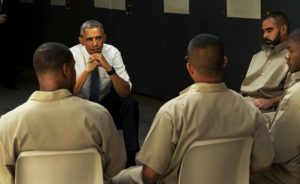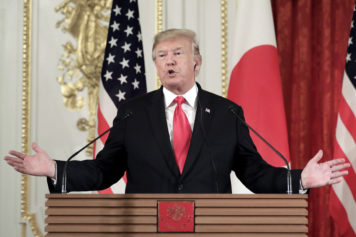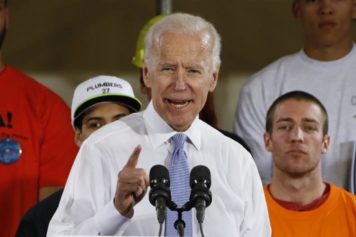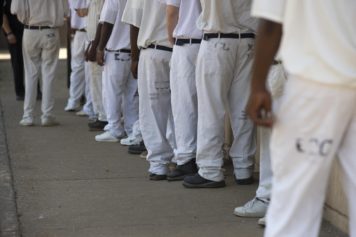
President Obama meeting with inmates at El Reno Federal Correctional Institution in Oklahoma on July 16, 2015. Courtesy of VICE Media.
President Obama became the first sitting U.S. president to visit a prison when he toured El Reno federal prison outside Oklahoma City on July 16. His visit, combined with a mass commutation of drug sentences and a speech before the NAACP, helped set his new agenda for reform of the American criminal justice system.
The presidential motorcade was met with demonstrators waving Confederate flags, according to Mother Jones. Ahead of the Obama visit, “Confederate Lives Matter” protests were planned in Oklahoma City, at a time when the systemic and intractable problem of racism—including racial violence and racism in the criminal justice system—is gaining more attention and seeping into the public conscience.
El Reno is a medium-security men’s facility of around 1,300 inmates in central Oklahoma. The prison is now home to Kwame Kilpatrick, the former mayor of Detroit, who was sentenced to 28 years in 2013 for racketeering, extortion, bribery and other crimes.
While the president praised El Reno for its educational and job training programs, he emphasized that such assistance arrived too late for these men.
“The question is not only how do we make sure that we sustain those programs here in the prison,” Obama said. “But how do we make sure that those same kinds of institutional supports are there for kids and teenagers before they get into the criminal justice system.”
The president also noted “enormous overcrowding issues.”
“Three, whole-grown men in a 9ft by 10ft cell – there’s been some improvement, now we have two, but overcrowding like that is something that has to be addressed,” Obama said.
Further, President Obama met with six inmates in the prison, and had a 45-minute discussion with the men, all of whom were nonviolent drug offenders, the Guardian reported. The president’s discussion with the inmates will air on the HBO series, VICE in the fall.
After meeting with the prisoners, as NPR reported, Obama told reporters, “These are young people who made mistakes that aren’t that different than the mistakes I made and the mistakes that a lot of you guys made.”
The president noted that what distinguishes many convicts from others are a lack of second chances and support structures.
“The bottom line is that in too many places, Black boys and Black men, Latino boys and Latino men experience being treated differently under the law,” Obama said, citing statistics showing that 60 percent of the nation’s inmates are Black and Hispanic even though both demographics make up just 30 percent of the population.
Despite the ubiquity of prisons in America, no sitting president has ever visited one, much less held a chat with a group of convicted men. These are bold steps for the nation’s chief executive, at a time when bold moves are required to liberate people—mostly people of a darker hue—who do not belong in the system at all. In the process, the nation will liberate itself from an institution of mass incarceration that is rooted in another dreaded institution, America’s original sin of slavery.
For the White House, it has been a week of championing the cause of criminal justice reform. Earlier this week, Obama spoke at the NAACP National Conference in Philadelphia, where he addressed the problem of mass incarceration in the U.S., a system which costs $80 billion a year to warehouse over 2 million people. Moreover, he commuted the sentences of 46 nonviolent drug offenders, highlighting the fact that too many people are locked up for far too long, and many should not have been imprisoned in the first place.
Prisons have become a shameful and uniquely American trademark, in a nation that imprisons more people than any other—on a per capita basis and in sheer numbers—including countries run by so-called dictatorships and authoritarian regimes.
Mass incarceration in the U.S. is informed by a tradition of the dehumanization of Black people through slavery and Jim Crow segregation, and a continued regime of systemic racial discrimination and white privilege. The U.S. presides over a prison plantation system in which two-thirds of the inmates are Black and other people of color, yet over 90 percent of the legal profession, those who administer the system, are white. Further, 95 percent of the prosecutors are white, and white men, who are only 31 percent of the population, are 79 percent of the prosecutors. This points to an inherently unfair, unequal and racially biased justice system.
The war on drugs has hit the Black community hardest, as Black people bear the brunt of a prison boom brought on by draconian and mandatory sentencing, specifically targeting them for punishment.
“The bottom line is that in too many places, Black boys and Black men, Latino boys and Latino men experience being treated differently under the law,” the president said. “By just about every measure, the life chances for Black and Hispanic youth still lag far behind those of their white peers,” he added.
“Our kids, America’s children, so often are isolated, without hope, less likely to graduate from high school, less likely to earn a college degree, less likely to be employed, less likely to have health insurance, less likely to own a home,” the president offered, lamenting that “it’s not normal” for so many young people to end up in the prison system. “It’s not what happens in other countries. What is normal is teenagers doing stupid things, what is normal is young people making mistakes.We’ve got to be able to distinguish between dangerous individuals who need to be incapacitated and incarcerated versus young people who are in an environment in which they are adapting, but if given different opportunities, a different vision of life, they could be thriving in the way we are.” President Obama said.
Recent actions by the president are part of a comprehensive agenda for change which includes curbing mandatory minimum sentences for nonviolent drug offenders, restoring the voting rights of people with a felony record, eliminating employment practices which require job applicants to disclose their criminal background, and better integrating ex-felons into society through an increase in job training programs.


